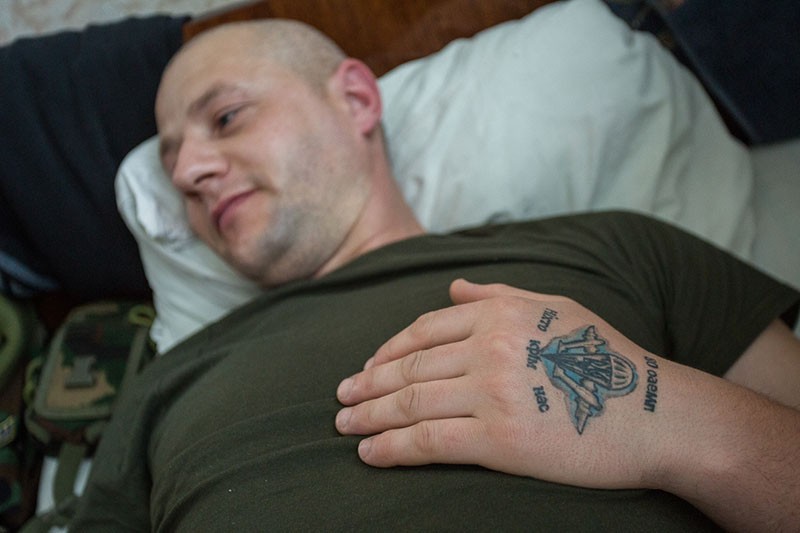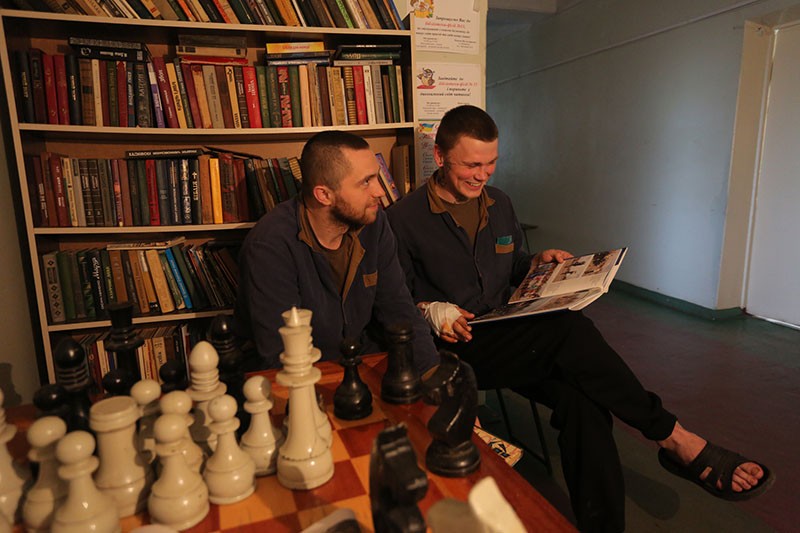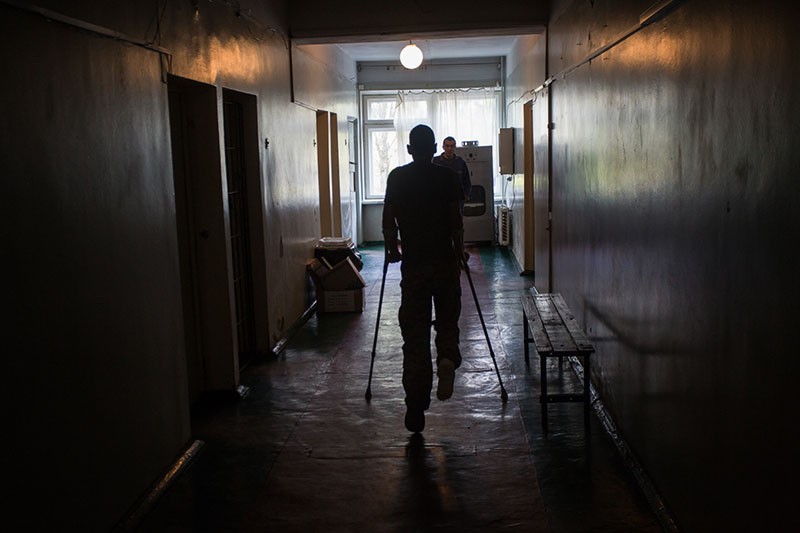POKROVSK, UKRAINE — Svitlana Ivantsova, a resident of the Ukrainian-controlled stronghold of Pokrovsk, approaches the checkpoint in the city of 64,000 people near the war front some 600 kilometers southeast of Kyiv.
Ivantsova, leading her elderly mother by the hand, tells a young soldier that a doctor is needed right away. The soldier calls for one from the mobile military hospital that has been saving soldiers lives since the start of Russia’s war in 2014.
“The doctors here never refuse health care for civilians,” Ivantsova explains. “And I’ve been told they don’t charge for checkups. We’re not rich, so asking the military is the best treatment we can get in our city.”
Some 15 minutes later, the soldier’s radio set buzzes again and he lets the women inside the camouflage-fenced military complex. It is a relocated and expanded version of the 66th Lviv Makeshift Hospital, now sharing space with a municipal hospital and civilian medical personnel.
“We’ve been working here in Pokrovsk since February 2015,” the hospital’s commanding officer Volodymyr Knygynytskiy says. “On our first day here, we got at least 100 wounded soldiers — the battle of Debaltseve was being unfolded then. In the worst times, we were receiving 300 people each day, and three or four evacuation copters were taking off to Dnipro every hour.”

A Ukrainian paratrooper rests in the Pokrovsk military hospital on May 15. (Volodymyr Petrov)
Knygynytskiy prefers working in Spartan field conditions, organizing his office in a narrow metal trailer in the hospital’s tent camp.
The days of the biggest bloodletting are hopefully gone forever, the high-ranking military doctor says.
But nevertheless, the war goes on — and the doctors have enough work to do.
At least 60 patients are receiving medical treatment in the Pokrovsk hospital at any given time.
“Here we receive the wounded from almost everywhere north of Donetsk,” Knygynytskiy continues. “When a soldier gets injured in action, he is evacuated from the combat zone and then stabilized by a medical unit. If necessary, he is transported for treatment to our hospital here in Pokrovsk and stays here under our care. But sometimes, when things go bad for a fighter, we do all we can and then evacuate him to the closest big stationary hospital in Dnipro by a helicopter — in hope of saving this life there.”
No refusals
Most of the injuries that Ukrainian soldiers and officers suffer are shell fragment wounds from the almost daily artillery duels with Russian-backed forces. During the worst fighting, doctors had to treat an extremely high number of sniper fire casualties, with military and civilian victims.
The policy does not make a distinction between military and civilians, Knygynytsky says, so the Pokrovsk military hospital helps everyone.
“For instance, in the evening of May 13, a residential house in Avdiyivka was suddenly smashed with an artillery projectile. Four civilians were immediately killed, and also one man got a heavy brain damage. Fortunately, our neurosurgeon managed to save him here at the hospital — he’ll be all right,” the doctor recalls.
“As a military medical setting during factual war time, we usually get the best equipment and personnel the country now has at its disposal,” Knygyntsky says. “So sometimes our civilian colleagues from the cities nearby give us telephone calls: ‘Guys, we’ve had a complicated case, we need your equipment.’ Of course, we always do our best to help the locals.”

Two Ukrainian soldiers look through magazines in the lounge of Pokrovsk military hospital on May 15. (Volodymyr Petrov)
Battlefield medicine
Amid war, medical services in Ukraine’s army has made a huge step forward, Knygynytsky says. Starting from early 2016, the military hospital under his command has received enough equipment, personnel and medicine.
“Before 2014, the military medicine in our country was being ruined by the failed ‘reforms.’ Very few of us had a true experience of battlefield services in Ukraine’s peacekeeping operations in Africa. Moreover, we were underfunded bitterly — this army was never meant to be winning wars, although the situation has greatly improved. Now I have personnel and equipment I could never even dreamt about before.”
The Pokrovsk military hospital is enormously proud to have five rapid response ambulance crews. Among other complicated equipment, it operates advanced lung ventilation devices and mobile ultrasound scanners.
“With devices like these, paramedics can examine a wounded soldier at the battlefield and disclose body cavities filled with the air, gore or other body liquids,” Knygynytsky explains. “Then, they usually can clean them up with puncture drainage, without any surgical treatment, and a soldier feels much better then. Sometimes they even just get up and walk free after this procedure.”
Over the past year, Ukraine’s army in the disputed Donbas has noticeably improved its skills in urgent combat on-site treatment. Since last year, the Pokrovsk military paramedics constantly train soldiers at the war front.
“By now we can say that Ukraine’s combat units in the war zone are generally well-trained in tactical medicine. Most of the soldiers and officers really can administer first aid for themselves and their wounded comrades-in-arms in action,“ Knygynytsky says.
Restful homefront
The military hospital is highly mobile — a real MASH, or mobile army surgical hospital, unit. It can be decamped and set up again within an hour.
So during the warm season, some of the hospital’s facilities are brought outdoors to the tent camp in the building’s yard. Both personnel and patients dine in the same big canteen tent, and the security platoon rests inside a booth barracks with TV sets, laptops on coffee tables — and also even an aquarium.

A Pokrovsk military hospital patient goes for bandaging procedure on May 15. (Volodymyr Petrov)
This spring, the nurses set up a greenhouse just beyond the hospital’s fence to cultivate some more vegetables.
Here, in the peaceful silence of Pokrovsk, Ukrainian soldiers and officers, often weary of war and its toils, have a chance to heal their bodies and souls. Apart from medicine and cure, many of them also need spiritual support, so anyone can seek confession from a Greek Catholic priest who volunteers as chaplain.
Previously, all religious services for the soldiers were delivered in any spare room in the hospital. Now, volunteers finish installing a simple small chapel in the yard, made of compressed wood and laminate. For those seeking psychological aid, a trained military psychiatrist also serves his duty in Pokrovsk.
In fine weather, some of the recovering patients play volleyball at the hospital’s court or simply enjoy homefront tranquility while sitting on benches in the sun.
However, most of the more seriously wounded soldiers spend their hospital days in wards, where they watch TVs with bad reception. Fortunately, there are only a few soldiers with serious wounds.
Most have less serious injuries, like Olexander Khananov, a young 80th Airmobile Brigade paratrooper with a bandaged right foot.
“Well, I got a shameful injury for a soldier like me,” he laughs. “I’ve been at war safely for quite a while, and recently I just fell off the infantry fighting vehicle and broke my ankle bone — it’s a non-combat injury, what the hell.”
Like many of his colleagues, he sees his hospital days as a chance to rest in a soft bed and finally get enough sleep, although most are eager to get back to the war front.
Others simply withdraw, remaining in shock from combat injuries or exhaution, nurses say.
“The war leaves a harmful dint on a human soul,” Taisiya Kryvoruchko, the hospital’s ambulant department head says. “A soldier’s spirit gets exhausted with constant nervous strain, hypothermia, and weariness in trenches. Sometimes, they eventually get a painful syndrome — they just start feeling strong pain, and they can’t sleep, eat or work because it hurts. In these cases, soldiers just need to have rest somewhere beyond the war — and we just take them for short treatment. After a couple of days of being left alone, most of them recover and spoil for the fight again.”
